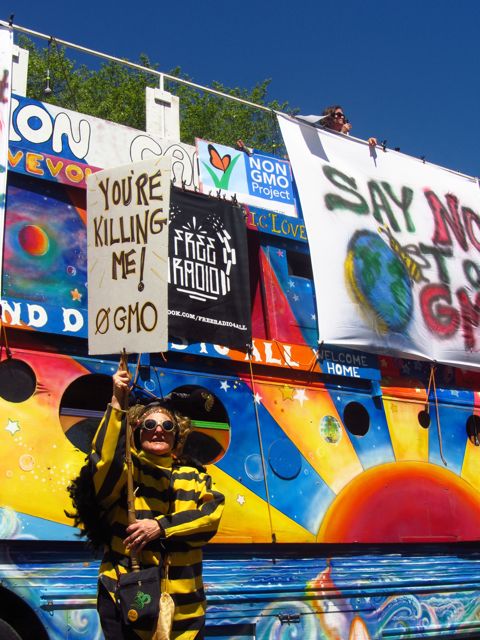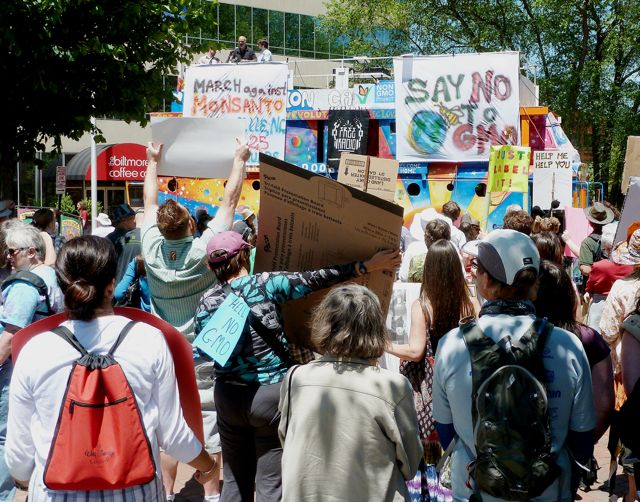More than 1,000 people gathered at Pack Square in downtown Asheville on May 26 to protest Monsanto, a multinational agriculture biotechnology corporation, and the world’s largest producer of genetically engineered seeds and pesticides. The rally and demonstration were part of an international “March Against Monsanto,” involving 36 countries worldwide.

— Photos by Jordan Foltz
Guest speakers, food activists, farmers, bee-keepers and chefs stood atop the multicolored “Magic Love Bus,” parked near Pack Square, to address a lively crowd of protesters. Citizens of all ages carried handmade posters and banners with slogans such as, “Label GMOs”; “Not Tested, Not Labeled, Not Natural, Not Safe, Not Wanted”; “Save the Bees”; and “Monsanto is Poison to the Planet.” The animated crowd — complete with drums, hula-hops and costumes — shouted, clapped and cheered throughout the event. The energy of the demonstration elevated with each address, culminating with a march through downtown Asheville.
Protestors wound their way down Broadway Street, up Lexington Avenue to Pritchard Park and down Patton Avenue before returning to Pack Square, stopping traffic along the route.

On the Agenda
Before the march, numerous activists spoke about food-related topics such as GMO labeling, pesticides, building relationships with farmers, genetically engineered trees and empowering consumer consciousness to support GMO-free and local foods.
Event organizer and activist Tom Llewellyn spoke about the importance of standing up as citizens and demanding change. “Obama said that GMOs should be labeled and yet, now, nearly five years into his presidency, there has been absolutely no movement,” he said. “We have to stand up as citizens, we got to flex that citizen-muscle and reach out to our Congress members, [and] to our representatives. Right here in Buncombe County, in Western North Carolina, we have an initiative to have a GMO-free Western North Carolina.” Llewellyn then directed listeners to an ongoing online petition.
City Council member Cecil Bothwell also addressed the crowd. “I’ve been an organic gardener since 1971,” he said. “I was a bee-keeper for a number of years, I know what kind of mischief these GMOs are doing, [and] the pesticides being produced by these big corporations, we don’t need them. We need to have a GMO-free WNC.”
Birke Baehr, a 14-year-old sustainable-agriculture advocate, best known as one of the youngest people to give a TED Talk, spoke about the importance of knowing where our food comes from. “I think that getting kids, adults — everyone — interested in their food system and knowing exactly where their food comes from and what’s in our food, is such an important thing, and that has been lost over the years,” he said.
Anne Peterman from the Global Justice Ecology Project, is currently working to block the proliferation of genetically engineered trees in the Southeast, said, “Genetically engineered trees are an emerging threat to the world’s forests, not only in the United States, but all over the world, and they are an especially big threat right here in the … South. There is a proposal pending right now to legalize freeze-tolerant eucalyptus trees to be planted all over the South. … We can stop genetically engineered trees.” See more about upcoming local events at nogetrees.org.
Rebecca Friedman, the owner of Farmer’s Daughter Catering, encouraged conscious consumer action. “I’m a caterer, and I use only seasonal, organic and locally sourced ingredients, and I use absolutely no GMOs. I buy direct from my farmers, and I will never buy anything from Sysco or U.S. Foods, or any other big-ag food provider. What if, collectedly, we vowed to spend our food dollars at stores and restaurants that share our values and provide organic and non-GMO food? Can we do this Asheville? Are you with me? We have massive economic impact collectively! But, to make it work, we have to be willing to pay the difference for those GMO-free ingredients.”
Dayna Reggero, an advocate for the environment and bees began her address with this: “‘Einstein said that, within four years, without important pollinators, that the human race would perish.’” She continued to say, “Right now, 200 million pounds of Roundup [an herbicide] is sprayed on crops around the country and another 100 million pounds is used in our yards, in our schools and in public park. … Food security does not mean going into a lab and making us food secure, it means ourselves, putting our hands in the dirt, and making ourselves foods secure. We need these bees, we need these important pollinators.”

Word on the Street
Xpress spoke with some protestors about why they came to the rally. Here is what they had to say:
Asheville resident Felicity Green said, “I feel that it’s very important that we be able to label what exactly we’re eating. I’m also not happy with Monsanto and other huge corporations having the influence in government that they do. They’re not people, they shouldn’t have human rights.”
Nelly Dawson of Sow True Seeds said, “We’ve been active in the GMO-free arena for a while. We’re actually involved in a lawsuit against Monsanto — a class-action lawsuit — with OSGATA [The Organic Seed Growers and Trade Association]. We got a GMO Free WNC petition that we’re collecting signatures for to declare GMO-free zones here in Western North Carolina. At the core, we believe in true seed, because you can’t patent life.”
Organic farmer and organic seed grower Peter Waskiewicz came out “Because there are too few people controlling our food supply, and they do not have our best intentions in mind, quite possibly the opposite.”
Beth Buzogany said, “It’s time to rein in Monsanto’s power.” Her husband, Buz Buzogany added: “We honestly believe in simple starts, and the simple start is making sure that everything is labeled, so at least you have a choice. We think the seed production shouldn’t be controlled by one or two companies in the United States or around the world.”
Curt Collins of Cullowhee said, “We don’t agree with being … tested on by genetically modified foods, we also don’t support Monsanto in general. I don’t support Roundup or Roundup-ready foods.You know I’m a farmer and I don’t want the wind carrying genetically modified pollen into my fields.”
Luke Trotman, a farmer in Asheville, working on a community garden at a recovery house on Grail Street, said, “I’m here to represent the youth farmers, and to have my energy here as a sovereign individual to support freedom from corporations and freedom from this spiritual confusion that we have going on within ourselves. [I am] trying to ford the revolution of people growing their own food, providing their own food, and not going to the supermarket anymore — it’s beyond that.”
 — Photo by Mike Cunningham
— Photo by Mike Cunningham




….and to think I spent the day working for a living. My life seems so meaningless now..
Your comment just makes you look ignorant.
If the health of your family and friends was a priority, you might have considered taking the day off.
Myself, I’m grateful to hear some insight from farmers and others who have an awareness of these issues. Especially since its impossible to find any criticism on television or in the mainstream print media.
There are things people shouldn’t have to worry about, like a GMO company deliberately altering the food supply without any previous testing to see if the GMO foods were safe for people to eat. Since the USDA is totally behind GMO crops, removing court restraints really means that there are no controls on GMO planting at all. No safety reviews (USDA can
The dangers posed to the natural environment by these genetically modified Frankenfoods is well documented, with additional scientific data amassing constantly. There is a growing body of evidence that this is linked to massive die-offs of bees, frogs, salamanders and other reptiles (part of ecosystems); a recent study shows that ecosystems are crashing around the globe, with dire consequences for all of us. Monsanto leads the world in introducing dangerous substances into our environment.
Contrary to the other view expressed, I applaud those who took a day off work or otherwise felt it important to speak out. Some things should be of a higher significance than another day at work. The health of the planet would be one of them, in my opinion.